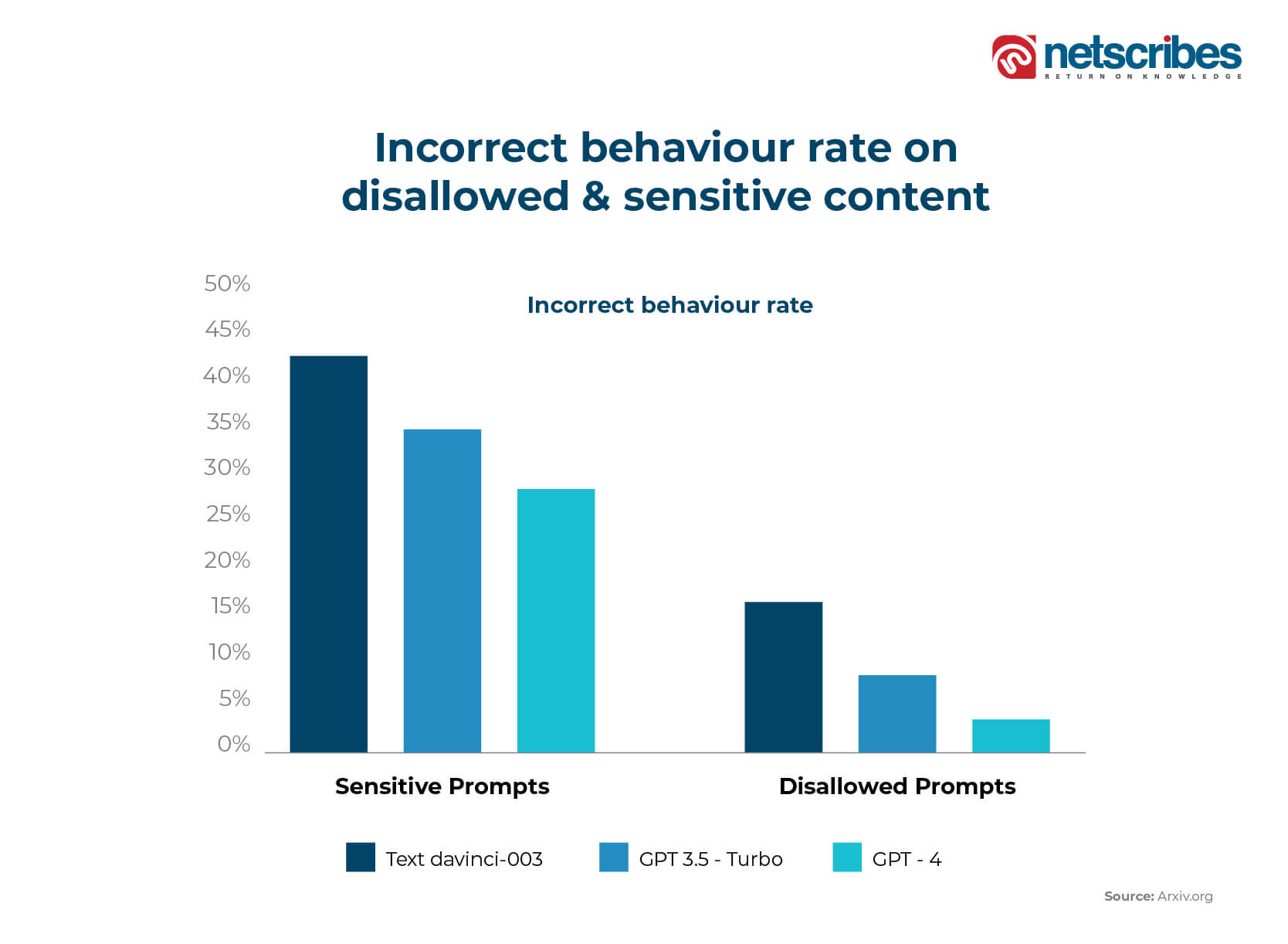The journey of OpenAI’s GPT (Generative Pre-trained Transformer) started with the launch of GPT-1, a generative language model in the year 2018. A year later came the GPT-2 which used a larger dataset with added additional parameters to construct a stronger language model. Gradually, in 2020, the GPT-3 was launched with a huge language prediction and generation model. It had about 175 billion parameters and was 100 times larger than GPT-2. Later, significant improvements with various iterations in GPT-3 led to the development of GPT-3.5 in the series, and the conversation-focused artificial intelligence (AI) chatbot, ChatGPT was created and released in November 2022.

ChatGPT from the day of its release crossed the 1 million user subscription mark within 5 days only.

In March 2023, OpenAI’s GPT journey continues with the launch of ChatGPT-4, the successor of ChatGPT and the most advanced system to date. It offers safer and more meaningful responses with advanced reasoning capabilities. It enables users to generate content. ChatGPT-4 is a large multimodal next-generation language model, trained on Microsoft Azure AI supercomputers and can process both text and image inputs, although as of now it can respond in text only.
It has successfully demonstrated human-level performance on many professional and academic benchmarks, such as the Uniform Bar Exam, and is capable of handling more complex tasks compared to its predecessors. GPT-4 can process more than 25,000 words of text for document search and analysis, content creation, and large conversations. ChatGPT-4 is available in ChatGPT Plus, a new subscription plan or service that offers ChatGPT-4 on a paid subscription of USD 20 a month.

The above chart depicts the incorrect behavior rate on sensitive and disallowed content. Sensitive prompts give us the rate of incorrect behavior on sensitive prompts (the lower the value, the better it is). The disallowed prompts show the moderation API trigger rates on the disallowed categories, which is the number of times a completion of a prompt is flagged by the moderation API (the lower the value, the better it is). GPT-4 model has a much lower incorrect behavior and trigger rates compared to its previous models.
What is the difference between ChatGPT-4 and its predecessors?
Lingual expertise: ChatGPT can create human-like text, ChatGPT-4 cannot only, understand and create various dialects, but it can also further respond to emotions expressed in the textual form. It can understand and respond sensitively to a user expressing sadness, frustration, or any other emotion.
Problem-solving capability: ChatGPT-4 has the capability to solve complex scientific and mathematical problems. It can process advanced calculus problems and can also imitate chemical reactions in a more efficient and effective manner compared to its predecessor.
Processing capacity: ChatGPT can process roughly 4,096 tokens which are around 8,000 words, whereas ChatGPT-4 can process up to 32,768 tokens, equivalent to 64,000 words.
Information processing: ChatGPT-4 can provide solutions to complex questions or queries by synthesizing information from multiple sources, which the predecessor fails to process.
Image and text processing: The previous version could only process text, but ChatGPT-4 can respond to both text and images. It can explain the content in an image, generate captions for it, and could even identify trends in a graph.
Programming features: Unlike ChatGPT, the successor, ChatGPT-4 can generate code snippets and could debug existing code more effectively, which will reduce the time of work from weeks to a few hours giving outstanding results.
Filters: In the earlier version, filters were added on top to prevent the system from giving answers to harmful and malicious queries. But ChatGPT-4 has such filters inbuilt which gently turn down the queries such as asking for guidelines for synthesizing sarin or ranking races by attractiveness.
Limitations that surfaced for ChatGPT-4
Lacking perfection: The latest version still faces issues such as hallucinations, social biases, and adversarial prompts, that lead to making reasoning errors.
Privacy concerns: ChatGPT-4 is trained on large amounts of data, including personal information, which arises the concern about how the data is collected, stored, and used, in applications such as chatbots and virtual assistants that interact with the users directly.
Illogical behavior: The system is completely dependent on the information provided in the input text or image to generate the responses. It lacks common sense or real-world experience to generate the output which may lead to absurd or incorrect responses for certain queries.
Knowledge of events: ChatGPT-4 does not have knowledge of current events and lacks real-time or up-to-date information. It has data on the events that occurred before September 2021.
How is the adoption of GPT-4 impacting businesses?
It has potential applications in education, gaming, healthcare, e-commerce and retail, tourism and hospitality, banking and finance, content creation, and customer service. Some of the applications mentioned below are aligned with various businesses.
Duolingo: Its new subscription tier, known as Duolingo Max! is incorporating GPT-4 technology that allows it to add two new features “Role Play”, an AI conversation partner, and “Explain my Answer”, which breaks down the rules when the user makes a mistake, here the accuracy of AI responses will improve.
Morgan Stanley: The company’s wealth management department deploys GPT-4 to organize its massive knowledge base and enable its wealth management personnel to locate relevant and important information. It will power an internal facing chatbot that carries out a comprehensive search of wealth management content and efficiently provide the combined knowledge of Morgan Stanley wealth management.
Khan Academy: A non-profit educational organization is launching “Khanmigo”, a GPT-4 based AI tutor or assistant, that functions as a classroom assistant for teachers and a virtual tutor for students. In the beginning, the Khanmigo pilot program will be made available to a limited number of participants.
Microsoft: The company is launching an AI-powered virtual assistant for cybersecurity professionals in the field of cyber defense known as “Security Copilot”. The easy-to-use AI assistant is based on OpenAI’s GPT-4 technology. It will identify threat signals, and breaches, and will also be able to analyze data in an efficient manner.
Related reading: The rise of ChatGPT: How generative AI is transforming business impact
Next steps
Microsoft, one of the biggest investors and stakeholders of OpenAI is investing an estimated amount of USD 10 billion in the company as per Bloomberg and Forbes for further advancement of the company’s complex AI models and to fuel its research capabilities. Additionally, new competitors of ChatGPT-4 are entering the market with their offerings. The alternatives of ChatGPT-4 include Google Bard by Alphabet Inc., Jasper Chat by Jasper, and YouChat by You.com.
ChatGPT-4 is going to be a big leap in the field of AI, having the capability to not only answer questions but also ask them. With scope for improvement, the technology has a huge potential for numerous applications across multiple industries and has started seizing the attention of both tech and business leaders around the globe.
Leading technology & industrial conglomerates and Fortune 500 companies partner with Netscribes to gain in-depth technology research to gain a strategic and competitive market edge. To know how your business can benefit from harnessing the potential of this emerging AI as a digital assistant to minimize efforts while maximizing ROI, contact us.
Based on insights by Ankit Asesh, Lead Analyst, Research & Information, TMT.






